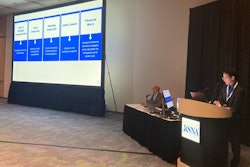
Screening for "financial toxicity" (FT) in cancer care could use improvement in the U.S., according to a review published May 16 in the Journal of the American College of Radiology.
The term refers to " the objective, subjective, and behavioral patient-level impact of the costs of cancer care," wrote a team led by Nadia Samaha of Johns Hopkins University in Baltimore. The group found that factors associated with worse financial toxicity for patients when it came to cancer care included being younger, having lower income and education, being of color, and having cancer at a more advanced stage.
"With the ever-escalating cost of cancer care, and the strong association between financial toxicity and poor patient outcomes, universal and routine financial toxicity screening is imperative in cancer care," the authors noted.
Even though financial toxicity in cancer care is pervasive and its impacts significant, there are no decisive measures to screen for it that have been effectively integrated into clinical practice, Samaha and colleagues explained.
"Cancer care poses major socioeconomic burdens to patients, caregivers, and health systems," they wrote. "Patients with cancer report higher out-of-pocket expenses, productivity losses, asset depletion, and medical debt including bankruptcy compared [with those] with other chronic diseases."
The authors evaluated current methods of assessing financial toxicity among patients with cancer and identified factors associated with higher risk of it via a review conducted according to the Preferred Reporting Items for Systematic Reviews and Meta-Analyses (PRISMA) guidelines.
The review included 51 studies that addressed financial toxicity in cancer care. The investigators evaluated FT measures and tools, time and setting of screening, FT prevalence, and sociodemographic or clinical patient-level associated factors.
Overall, they found that the following factors were among those that tended to make FT worse for cancer patients:
- Minority race or ethnicity
- Younger age
- Being female
- Having less education
- Living in a rural area
- Being unemployed
- Losing revenue from missed work
- Undergoing systemic treatment
- Recurrent disease
- Delaying or avoiding care
- Longer follow-up time
They then suggested possible organizational fixes, including making policy changes for drug patents and private market price regulation; mandating up-front cost transparency for public and private insurance; developing and incorporating guidelines on widespread FT-specific screening; expanding workplace protections for individuals impacted by cancer; creating reimbursement models for FT screening (i.e., billing codes); and integrating a structural process for FT screening (for example, EMR surveys, routine check-in/waiting room forms).
"Our findings demonstrate that there is wide variability in FT screening practices including in the timing (diagnosis versus treatment versus survivorship), setting (clinic-based, online, telephone/mail), utilized tools … and interpretations of screening results," the authors wrote. "Further research and multifaceted interventions identifying best practices for FT screening are needed."
The complete review can be found here.



















